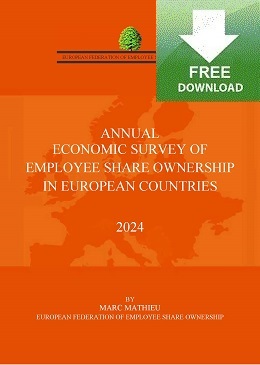|
EFES NEWSLETTER - APRIL 2025
|

|
JUST
RELEASED
The
new "Annual Economic Survey of Employee Share Ownership
in European Countries" is just released
More information
in
partnership with


|
|
 Employee
share ownership in Europe in 2024
Employee
share ownership in Europe in 2024
1.
The paradigm shift in European employee share ownership
is becoming increasingly apparent. In terms of dynamics,
large companies are giving way to SMEs. In this case,
employees do not share "a small piece of the cake",
they acquire the biggest piece in most cases, the
whole cake. The context and objective are not so much
to share profits as to meet the need for business transfers.
Great Britain is becoming Europe's number one, while
the continent, and France in particular, are fading
into the background.
2. The paradox is deepening when it comes to employee
share ownership in large European companies. Everything
indicates that companies want it. Everything indicates
that employees want it too. Companies are increasing
the number of employee share plans. Yet overall, the
number of employee shareholders is falling, employee
ownership stake is stagnating, and the democratisation
of employee share ownership is crumbling. As a result,
the plans are becoming less and less effective. The
plans and policies behind them are becoming increasingly
undemocratic.
3. Why is employee share ownership taking a hit in
Europe's large companies? The main reason is political.
It is about the inability of European legislators to
produce legislation in line with the development of
large companies.
Today,
only 35% of the employees of large European companies
are still based in their home country (Graph 79 page
144). As a result, only a small minority of them
are able to benefit from the tax incentives for employee
share ownership set out in national legislation. Employee
share ownership policies, for example, have lost 30%
of their effectiveness in just a few years because they
remained national in scope.
When it comes to employee share ownership, as with so
many other issues, Europe is sick of its political divisions
and localised thinking. European
legislators continue to rely on outdated frameworks
and mechanisms. This explains why recent legislative
efforts in several countries have had no significant
impact on employee share ownership in large companies.
France's Loi Pacte is the ultimate example of this impotence.
4. A strong employee ownership movement is now taking
hold in European SMEs, starting in Great Britain. In
this country, employee buy-outs are now the most common
form of transfer for SMEs, after family transmission.
We are rapidly moving towards a situation where one
in ten SMEs will be employee-owned. With 600 SME transfers
to employees in 2024, Great Britain created 50,000 new
employee owners in just one year, as many as all the
workers cooperatives in France (SCOPs) over an entire
century.
For employee share ownership worldwide, this marks
a true revolution. In fact, for almost two hundred
years, numerous frameworks and models have been tried
and tested to develop employee ownership in SMEs. Today,
for the first time in the world, we have succeeded in
setting up a model that outperforms all others. Since
1974, the world's best-known model had been the ESOP
plan in the United States. The Employee Ownership
Trust formula introduced in the UK in 2014 now appears
to be by far the most effective.
The reasons behind its success are well understood:
well-designed legislation based on trust mechanisms.
This is what ensures its three advantages of simplicity,
ease and adaptability, in a way that no other model
has been able to achieve.
As a result, the UK is the only European country (along
with Norway) where the number of employee owners has
increased over the last twelve years.
|
Press
review
A
selection of 19 remarkable articles in 9 countries in March
2025: Austria, Canada, Czech Republic, France, Italy, Morocco,
Türkiye, United Kingdom, USA.
Austria: For 25 years, Voestalpine has been the iconic
example of employee share ownership in large European companies.
Canada: The Employee Ownership Trust scheme was established
in 2024 for business transmission to employees. Secure Canadian
sovereignty is a key reason to promote Employee Ownership
Trusts.
Czech Republic: Yet another failure to implement legislation
adapted to employee share ownership in startups.
France: Employee share ownership is the collateral
victim of the French budgetary drift. New employee share plan
for Dassault Systèmes. Urbicand is the example of a business
transfer in the form of an employee cooperative in France.
Italy: New employee share plans for ClubDeal Digital,
for Snam, for A2A.
Morocco: Employee share plan for Airbus.
Türkiye: Growing trend for employee share ownership
in Türkiye.
UK: Thanks to the Employee Ownership Trust formula,
two new SMEs are transferred to their employees every day
now. This month, among others, the case of: Coda Marketing
Communication, Pest Control Supermarket.com, Loop Marketing
Agencies, Attraction Tickets.
USA: ESOP transmission for Green River Data Analysis,
combining the legal structure of an Employee Stock Ownership
Plan (ESOP) with governance derived from a cooperative model.
The full press review is available
on:
https://www.efesonline.org/PRESS
REVIEW/2025/March.htm
|
 A
political roadmap for employee ownership in Europe
A
political roadmap for employee ownership in Europe
 The
EFES needs more members. Download the EFES membership form
The
EFES needs more members. Download the EFES membership form
 What's
new on the EFES website?
What's
new on the EFES website?
 EFES NEWS
distribution: 200.000
EFES NEWS
distribution: 200.000
|